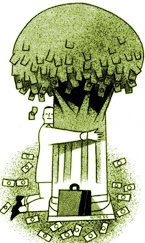
Doug Bandow
http://www.jewishworldreview.com -- IT IS A SAD SPECTACLE. President Bill Clinton, desperate to salvage his scandal-laced legacy, crisscrossing the nation proposing new spending programs and regulatory initiatives with wild abandon. He seems determined to jettison his one good bequest to the nation: a less loony Democratic Party.
Clinton's moderation was always heavier on rhetoric than practice.
Nevertheless, his early political defeats helped moderate his worst excesses.
That made left-wing social engineers apoplectic. They need not have worried. Clinton is busy seeking to bring back the good ol' liberal days of regulation.
The Clinton administration has some 4,538 regulations in process, 137 of which are "economically significant" and will cost at least $100 million each. The number of these big rules is up nearly a fifth from just a year before.
The biggest regulator is the Department of Transportation, followed by the Environmental Protection Agency; each account for more than one-tenth of the total. The Departments of Treasury, Commerce, Agriculture and Interior follow.
Last year, the Federal Register, Uncle Sam's compendium of rules, ran 71,161 pages, a 4 percent increase over 1998. That is the highest since 1980, during the glorious Jimmy Carter presidency.
The federal government spent about $1.7 trillion last year. Much of it was wasted, but at least there was theoretical accountability since Congress voted the money. Not so regulation, which Thomas Hopkins of the Rochester Institute of Technology figures cost Americans about $758 billion, almost 45 percent of official federal budget outlays.
All told, in 1999, every American family paid about $7,400 a year for the privilege of being watched, controlled, prodded, nannied and governed. That is essentially a separate income tax of almost 20 percent per household.
This is, in effect, taxation without representation. As Clyde Wayne Crews of the Competitive Enterprise Institute puts it, "Regulatory initiatives allow government to direct private-sector resources to a significant degree without much public fuss."
Politicians pass bills expressing popular sentiments (e.g., cleaner air and water). Unknown staffers buried within the bowels of the bureaucracy then write the real law.
 |
There was a time when reformers thought the answer was to elect Republicans. Give the GOP control of Congress, it was said, and they will rein in the regulators. Now we know better.
Four years ago, Congress enacted the Congressional Review Act, which requires all agencies to submit their rules to Congress. Lawmakers then have 60 days to use an expedited process to block the proposals. Not once has Congress acted.
Perhaps every regulation advanced by the administration has been a good one. All 4,684 final rules issued in 1999. And the 4,899 implemented the year before. And the 4,584 imposed in 1997. More than 14,167 new regulations passed after Congress approved the CRA, and apparently not one warranted rejection.
Obviously, most federal rules do some good. But too often, Uncle Sam overestimates speculative benefits, inflating cost-benefit calculations.
There is, for instance, no evidence that OSHA, despite costing American business billions of dollars, has reduced workplace deaths or injuries.
The Food and Drug Administration, by unnecessarily slowing the introduction of new pharmaceuticals and medical devices, actually cost lives.
Indeed, a Harvard University study figures that diverting money from productive uses -- medical research, safer homes, etc. -- to combat trivial dangers actually kills 60,000 people a year.
Regulators rarely compare the relative degree and likelihood of different harms. Thus, Uncle Sam often focuses his time and our money on minute risks.
Several rules, ranging from benzene to dichloropropane to formaldehyde to chloroform, are estimated to cost from hundreds of millions to literally trillions of dollars per life saved.
Even when regulations make sense in theory, Washington frequently dictates specific outcomes when greater flexibility would allow individuals and businesses to achieve better results for less. Many environmental rules suffer from this flaw.
Reform should start with electing a Congress that legislates and delegates less, and a president committed to restricting the quasi-laws now flowing from the federal bureaucracy. Clyde Wayne Crews also suggests several procedural changes in his new study, "Ten Thousand Commandments," published by CEI (www.cei.org).
For instance, Congress should require publication of all available economic data, create a regulatory report card by program and agency, and establish a regulatory budget. Most important, in his view, is "congressional approval - rather than agency approval - of both regulations and regulatory costs."
This is an agenda that Gore, busy pandering to the usual Democratic
interest groups, is unlikely to advance. Thus, it is up to George W. Bush is
demonstrate that he is serious about being a "reformer with results." The
result we need is to return today's regulatory state to the genuine rule of
JWR contributor Doug Bandow is a senior fellow at the Cato Institute.
Comment by clicking here.
06/01/00: Administration stupidity, congressional cowardice
05/25/00: The silence of the international community
05/18/00: Protecting the next generation
05/11/00: Freer trade with China will advance human rights
05/04/00: How not to save the Constitution
04/28/00: American tripwire in Korea long ago disappeared: Why are we still involved?
04/18/00: Clinton administration believes the IRS is too gentle, wants more auditors
